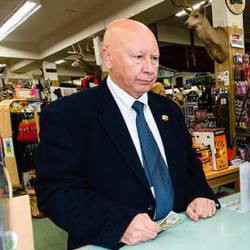Pennsylvania Gambling Bill Aims To Jail Online Gamblers

Since Pennsylvania legalized casino gambling in 2004, the state has quickly risen to replace neighboring New Jersey as the United State’s second-biggest gambling market. In 2013, alone, the Keystone State collected $1.4 billion in casino taxes and $16.4 billion overall since gambling records began.
GOP lawmaker Mario Scavello proposes anti-internet gambling bill
Just like New Jersey, Pennsylvania’s large population of 12.76 million also lends itself to providing a more viable online gambling industry than many of its competitors. Nevertheless, not everyone is keen to see the state’s gambling industry widen and one of the state’s lawmakers not only wants to ensure online gambling never becomes a part of Pennsylvania’s expanding gaming industry, but also has proposed anyone found gambling online should face a fine, or even time behind bars.
State Representative Mario Scavello (photo) would appear to be squarely in the Sheldon Adelson camp when it comes to internet wagering and amongst the usual list of concerns trotted out by the Republican Party lawmaker is the worry underage players and problem gamblers will readily be able to access gambling websites, with all the ills that involves. As Scavello, explains:
“Here again, online gambling is best described as the Wild West. Online, there’s no one around to keep an eye on someone who doesn’t know when to stop.”
As a result Scavello has proposed an anti-online gambling bill which would penalize Pennsylvania residents with some of the most restrictive set of punishments in the whole of the US. According to Scavello’s bil, a first time offender could expect a fine of up to $300 and possibly a 90 day stretch in jail, while after a second offence the punishments rise to a maximum fine of $2,500 and possibly a year behind bars.
“I believe that if you hit people in their wallets, we can start to crack down on the lawbreakers,” said Mario Scavello.
CSIG offers immediate support
Unsurprisingly, Sheldon Adelson’s ‘Coalition to Stop Internet Gambling’ (CSIG) immediately lent their support to Scavello’s bill and the advocacy group subsequently called upon the Pennsylvania Legislature to “vote in favor of this bill and send a powerful message that online gaming has no place in American society.”
However, so far Scavello’s bill has found only limited support in the state legislature, specifically amongst fellow Republicans, such as State Rep. Paul Clymer, R-Bucks and state Rep. David Millard, R-Columbia, who said:
“We know that online gambling leads to a lot of exploitation by various dubious characters that are out there that want to take advantage of our youth and people who do have an addiction. Being addicted to gaming is like a cancer in our community.”
Pennsylvania continuing to seek gambling expansion
Mario Scavello’s draconian anti-internet gambling bill comes at a time when the USA’s 6th most populous state has actively been looking for ways to expand its gambling industry. The state has already approved slot machines for bars and clubs, while Governor Tom Corbett has proposed that the Pennsylvania Lottery should also be permitted to offer keno games to state residents. Furthermore, gambling has long been seen as a key element in boosting Pennsylvania’s finances and addressing its long-term structural deficit.
Nevertheless, Scavello has attempted to garner support for his anti-online gambling crusade by suggesting online gambling could drain revenues from existing land-based casinos, and potentially lead to job losses and lower revenues for the state. The GOP lawmaker also claimed that internet wagering could be used by criminals for money-laundering purposes, a line of reasoning highlighted recently in a scare-mongering ad campaign aired by ‘the Coalition to Stop Internet Gambling’, stating that:
“While the FBI is busy defending against terrorist threats and cyber-attacks, Internet gambling will give criminals across the world a foothold in every American household, attracting criminal activity not only at home but internationally.”
In spite of anti-online groups using obvious tactics to exaggerate the threat posed by internet gambling, more US state lawmakers increasingly seem to believe that regulated online gambling legislation would offer the best protection for consumers, while the true danger lies in allowing unregulated offshore operators to thrive in a grey market.
Furthermore, cash-strapped states now seem more open to the possibility of embracing a US online gambling industry estimated to be worth $9.3 billion by 2002, especially as US online gamblers have continued to play at US-friendly poker sites, in spite of the 2006 UIGEA Act, and the DoJ’s Black Friday operation. As Iowa Senator Brian Schoenjahn, commented recently”
“If people are going to do it [play online poker] anyway, maybe Iowa ought to take a piece of the pie and regulate it.”










